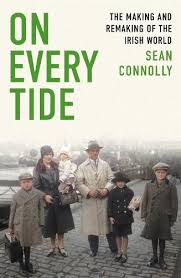
My mother’s maiden name was Connolly. As a child, she was sent ‘home’ to Ireland, during the Second World War, with her sister (my Auntie Phyllis) to safeguard them from German bombs and to make their Roman Catholic faith bombproof. She didn’t talk about it, certainly not to me, but there were whispers of predatory paedophilic attempts. And as outcast Irish, they were treated like cow shit. My Auntie Phyllis and my mum had a lifelong-bond based on shared hardship. They were Irish immigrants of a different kind, but they faced the same kind of prejudices and poverty.
My dad was born in Northern Ireland. But he came here as a child. His dad was here and his mum died early. He went to Our Holy Redeemer’s School (still going strong) in Whitecrook. He had a Scottish accent. Not Irish, like my Uncle Charlie and my godmother, Auntie Josie. Or like Pat McDaid’s dad, or Sporter Sweeney or Boxer Toi’s dad. We’re second or third generation and experience the cultural fade of fitting in and marrying into the existing population. Most of us remain mad Glasgow Celtic fans.
In the United States, it is evident that there is little or no difference between the second and third generation Irish who voted Republican and for Trump, the moron’s moron. A generation ago, when John Kennedy won by a very slim majority (and a bit of electoral cheating) Catholics were demonised and if it wasn’t for the electoral blocks delivered wholesale by Capos of the Irish-Catholic, Democratic, immigrant machine, he would have lost.
The Ireland my Uncle Charlie and Auntie Josie left a lifetime ago was rural. What little industry there was in the North, in Belfast, weaving and shipbuilding. The population halved after the Irish Famine (there was also a Scottish Famine mostly in the Highland and Islands) but it was in Ireland were subsistence farming meant the humble potato was breakfast, lunch and dinner for millions that famine took around a million lives directly and indirectly.
Ironically, the root cause may have been a cargo of seed potatoes from across the Atlantic in 1845. The population of Ireland had doubled from 4.4million in 1791 to above 8 million in 1841. Almost 90% of the population depended on the potato. The more prosperous tenant farmer who could afford a cow had assets to sell. Most did not. All they could offer was cheap labour.
An estimated 109 000 sailed for North America in 1846, almost double the total of the beginning of the Famine. What we now know as Canada, Australia, New Zealand and Argentina were less popular destinations. For those with little or no money, the short hop across the Irish Sea meant that tens of thousands a week ended up in the ports of Liverpool and Glasgow.
In their poverty and need, we were caricatured as sub-human and disease stricken. There was some truth in the latter. Ships bringing export goods from America and the British colonies filled their holds with human ballast, which they could charge a fee, and make the return journeys profitable.
For babies, one-in-seven did not survive the journey. Those packed below deck had a nominal space of 6 feet by 3 feet for married couples. Toilets were rudimentary. Women, in particular, crouched down and shat and urinated wherever they could. Water and food were rationed. Typhoid and dysentery were not. Coffin ships delivered their cargoes to cities that started asking for bonds to offset the cost of treating the ill, but which pushed up prices and more ships towards Canadian ports. But more than 90% made it ashore and became citizens. Women, in particular, became a prized asset.
When my Uncle Charlie left Ireland the population was still haemorrhaging the young and fit, but the destination pre-and-post War—with the Hungry Thirties as an interlude—was to British cities. Cities that were crying out for cheap labour the Irish specialised in. Labour that dug canals with pick and shovels, connected railways across continents, created reservoirs and build road after road and house by house helped make Britain and its former colonies Irish enough to have St Patrick’s Day parades and indulge the bonhomie of a green and pleasant land usurped by British rule. Step forward President Joe Biden, following in the footsteps of JFK, Jimmy Carter, and even Ronnie Reagan whose aspirations were more Protestant blue blood.
Ireland, that Irish tiger that has become a parking space for big corporations—with promises of low taxation—inside the EEC has seen its population double from when my Uncle Charlie left Ireland to around five million. It has more Polish immigrants than Britain. And to my great shame has also played the race card. Demonising immigrants while most of its wealth, like in Britain, goes to the rich and Irish 1%. The most oppressed people ever banner, once worn with pride, is now a rallying cry to deport and demonise those at the bottom. Cultural fade. Not for me. I’m not buying into that propaganda. We’ve a different kind of famine in housing and public services and it’s the rich that we need to pay their way. Not the poor, oppressed masses that America once claimed to represent as a sanctuary and offer a welcome. I’m not ashamed to be part Irish. I’m ashamed of such policies finding fertile soil in whatever side of the Atlantic you happened to be standing on. Sean Connolly offers a comprehensive account of what it means to be Irish, but that doesn’t mean the story is ended. It’s still being written by us now and I don’t like what I’m seeing or hearing.
- 😈 “Unleash the Beastie! https://bit.ly/bannkie
- 📚 Share the Magic, Share the Page! 🌟 #BeastieNovel #BookBuzz” 😈
.


